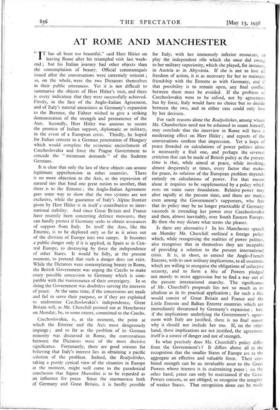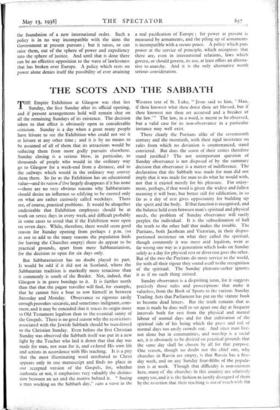AT ROME AND MANCHESTER " I T has all been
too beautiful," said Herr Hitler on leaving Rome after his triumphal visit last Week- end ; but his Italian journey had other objects than the contemplation of beauty. Official communiqués issued after the conversations were extremely reticent ; so, on the whole, were the two Dictators themselves in their public utterances. Yet it is not difficult to summarise the objects of Herr Hitler's visit, and there is every indication that they were successfully achieved. Firstly, in the face of the Anglo-Italian Agreement, and of Italy's natural uneasiness at Germany's expansion to the Brenner, the Fiihrer wished to give a striking demonstration of the strength and permanence of the Axis. Secondly, Herr Hitler was anxious to secure the promise of Italian support, diplomatic or military, in the event of a European crisis. Thirdly, he hoped for Italian consent to a German penetration of Hungary which would complete the economic encirclement of Czechoslovakia and force the Prague Government to concede the " minimum demands " of the Sudeten Germans.
It is clear that only the last of these objects can arouse legitimate apprehension in other countries. There is no more objection to the Axis, as the expression of natural ties that bind one great nation to another, than there is to the Entente ; the Anglo-Italian Agreement goes some way to show that the two systems are not exclusive, while the guarantee of Italy's Alpine frontier given by Herr Hitler is in itself a contribution to inter- national stability. And since Great Britain and France have recently been concerting defence measures, they can hardly protest if Germany seeks to obtain assurances of support from Italy. In itself the Axis, like the Entente, is to be deplored only so far as it arises out of the division of Europe into two camps. It becomes a public danger only if it is applied, in Spain as in Cen- tral Europe, to destroying by force the independence of other States. It would be folly, at the present moment, to pretend that such a danger does not exist. While the Dictators were contemplating beauty in Rome, the British Government was urging the Czechs to make every possible concession to Germany which is com- patible with the maintenance of their sovereignty. In so doing, the Government was doubtless serving the interests of peace. At the same time, if the concessions are made and fail to serve their purpose, or if they are exploited to undermine Czechoslovakia's independence, Great Britain will, as Mr. Churchill pointed out at Manchester on Monday, be, to some extent, committed to the Czechs.
Czechoslovakia, is, at the moment, the point at which the Entente and the Axis most dangerously impinge ; and so far as the problem of its German minority was discussed in Rome, the conversations between the Dictators were of the most decisive significance. Fortunately, there are good reasons for believing that Italy's interest lies in obtaining a pacific solution of the problem. Indeed, the Realpolitiker, taking a purely cynical view of the situation in Europe at the moment, might well come to the paradoxical conclusion that Signor Mussolini is to be regarded as an influence for peace. Since the rearmament both of Germany and Great Britain, it is hardly possible for Italy, with her immensely inferior resources, to play the independent role which she once did owing to her military superiority, which she played, for instance, in Austria as in Abyssinia. If she is not to lose all freedom of action, it is as necessary for her to maintain friendship with the Entente as with Germany, and if that possibility is to remain open, any final conflict between them must be avoided. If the problem of Czechoslovakia were to be solved, not by agreement but by force, Italy would have no choice but to decide between the two, and in either case could only lose by her decision.
For such reasons alone the Realpolitiker, among whom Mr. Chamberlain need not be ashamed to count himself, may conclude that the interview in Rome will have a moderating effect on Herr Hitler ; and reports of the conversations confirm that impression. Yet a hope of peace founded on calculations of power politics alone is necessarily a frail one, and perhaps the severest criticism that can be made of British policy at the present time is that, while aimed at peace, while invoking, almost desperately at times, every factor that makes for peace, its solution of the European problem depends entirely on calculations of power. For that reason alone it requires to be supplemented by a policy which rests on some surer foundation. Relative power may alter rapidly at the present time, and there are many, even among the Government's supporters, who fear that its policy may be no longer practicable if Germany succeeds in extending her power over Czechoslovakia and then, almost inevitably, over South Eastern Europe. By then she may dictate what terms she pleases.
Is there any alternative ? In his Manchester speech on Monday Mr. Churchill outlined a foreign policy which, while recognising the realities of power politics, also recognises that in themselves they are incapable of providing a solution to the present international crisis. It is, in short, to extend the Anglo-French Entente, with its new military implications, to all countries which are willing to recognise the obligations of collective security, and to form a bloc of Powers pledged not merely to resist aggression but to find a way out of the present international anarchy. The significance of Mr. Churchill's proposals lies not so much in its idealism as in its practical application ; for such a bloc would consist of Great Britain and France and the Little Entente and Balkan Entente countries which are immediately threatened by Germany's expansion ; but, if the implications underlying the Government's agree- ment with Italy are justified, there is no final reason why it should not include her too. If, on the other hand, these implications are not justified, the agreement itself is a source of danger and not of strength.
In what precisely does Mr. Churchill's policy differ from the Government's ? It differs above all in the recognition that the smaller States of Europe are in the aggregate an effective and valuable force. Their con- bined strength can be an invaluable asset to the Great Powers whose interest is in maintaining peace ; on the other hand, peace can only be maintained if the Great Powers consent, or are obliged, to recognise the integrity of weaker States. That recognition alone can be made the foundation of a new international order. Such a policy is in no way incompatible with the aims the Government at present pursues ; but it raises, or can raise them, out of the sphere of power and expediency into the sphere of justice. And until that is done there can be no effective opposition to the wave of lawlessness that has broken over Europe. A policy which rests on power alone denies itself the possibility of ever attaining a real pacification of Europe ; for power at present is measured by armaments, and the piling up of armaments is incompatible with a secure peace. A policy which puts power at the service of principle, which recognises that there are, even in international relations, laws which govern, or should govern, its use, at least offers an alterna- tive to anarchy. And it is the only alternative worth serious consideration.















































 Previous page
Previous page